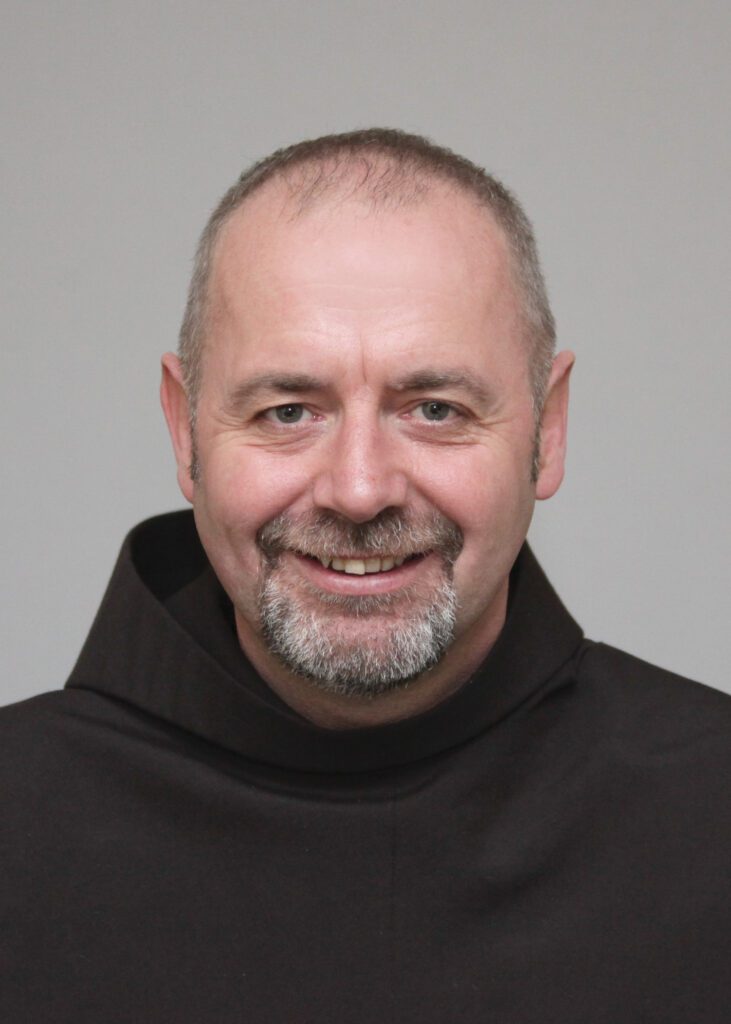
Franciscan friars lead fascinating lives. In dedicating themselves to caring for the poor and marginalized, they perform extraordinary acts of kindness and meet amazing people from all walks of life and corners of the world.
And they were fascinating people before they became friars. After all, each of them answered a calling to serve others—not everyone who hears a calling has the gumption to answer. One of those fascinating people is a Franciscan friar of the Province of Our Lady of Guadalupe, who was once one of 11 family members living in the same house, a family support worker who helped middle-school children find adoptive families, and a chef who opened a restaurant on a weather-beaten island in the North Atlantic.
That Franciscan friar is Fr. Frank Critch, OFM, who hails from Newfoundland, Canada. Today, Fr. Frank is the Director of The Franciscan Store, which strives to embody St. Francis’ teachings by offering a variety of spiritual resources, such as prayer cards, books, and religious articles.
Since May 2020, proceeds from the Franciscan Store have provided food for over 5,500 families.
Fr. Frank is also one of the charismatic personalities on Franciscan TV’s Friar Chef, “a cooking series where faith, food from different cultures, and fun-loving friars are the main ingredients!”
Cooking with diverse personalities is something Fr. Frank is used to—you might even call it a family tradition.
“My mother was part of the church community and always helped with catering weddings and funerals,” shares Fr. Frank. “And we had a big family. There were eleven of us, so that was like a restaurant in itself—everyone chipped in!”
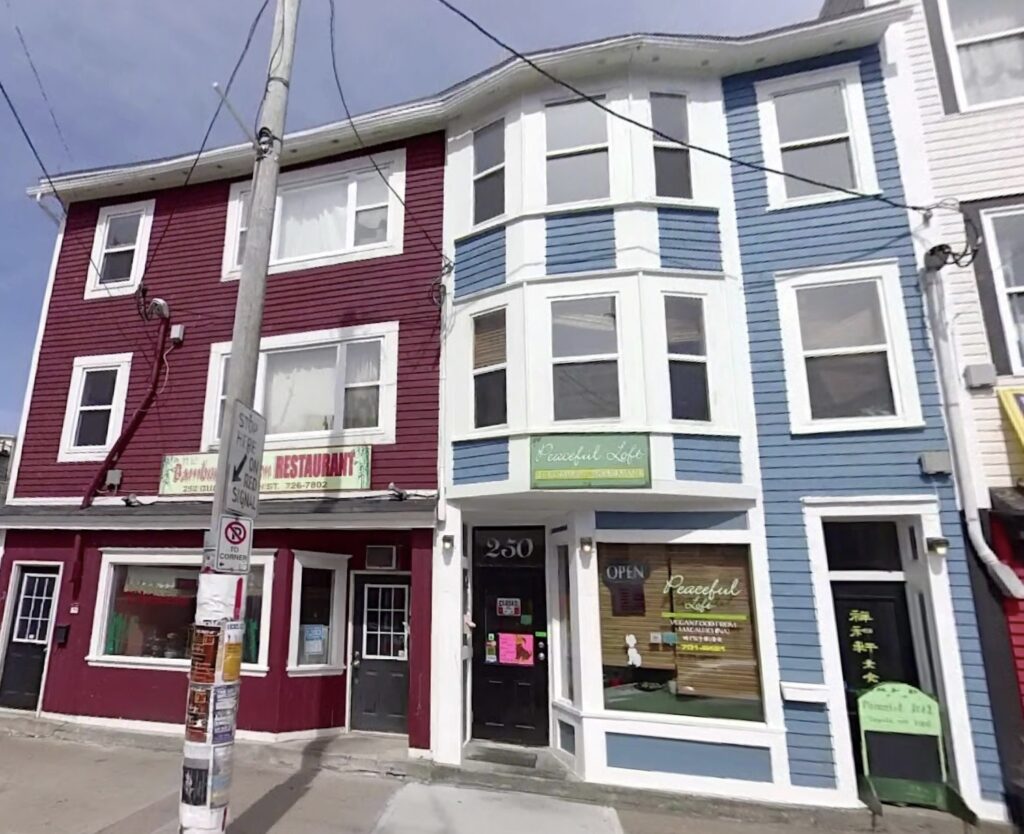
Fr. Frank’s mother’s homemade fish cakes are one of his favorite dishes of all time! According to Fr. Frank, the best fish dishes are enjoyed in Newfoundland—come on now!
His family’s all-cooks-on-deck mentality came in handy during his time at Christian Brothers novitiate.
“At Christian Brothers, we had no other choice,” says Fr. Frank. “We had to cook when we were there, so we had to work to find recipes and foods we were comfortable with. Sometimes, we had to cook for 50 people, so it forced us to be resourceful and creative. I love cooking, so I enjoyed it!”
Wherever he’s lived, cooked, worked, or served, it’s safe to say that helping others was a habit of Fr. Frank’s long before he earned the right to wear one.
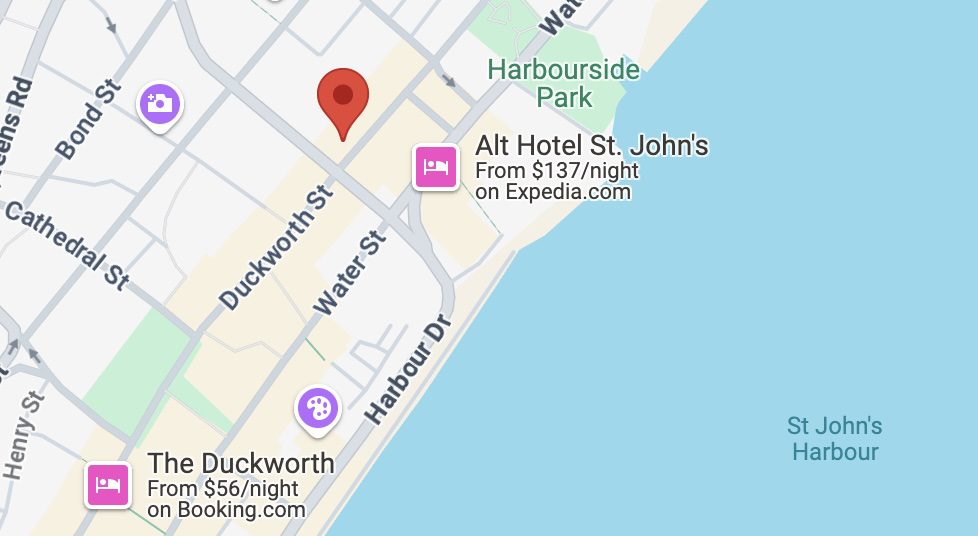
“Before joining the friars, I worked part-time as a family support worker in a school, mostly with middle school students who were about to be apprehended from their homes or had already been apprehended. I helped them find families and people who were adopting or fostering kids.”
Another of Fr. Frank’s pre-habit experiences took place at Camosun College, where he went through an intensive, hands-on chef’s program that honed his skills in the kitchen. After college, he, his sister, and another partner opened the Duck Street Bistro on Duckworth Street in St. John’s, Newfoundland.
“We were going to call it the ‘Duckworth Street Bistro’ since Duckworth Street was a popular thoroughfare, but we made a mistake on one of the applications. We wrote just ‘Duck St.,’ and that stuck!”
Ironically, it was tough to find a typo on the Bistro’s menu because the staff rarely got advance notice on what to write!
“My sister and I determined the menu together,” says Fr. Frank. “I did dinner, and my sister did lunches, but we never really knew what the fishermen were bringing in! So, we had a fish supplier, a fishmonger, and we used to phone him to see what the boats had coming that day. Could be halibut, cod, lobster, mussels—it could be a bit of anything!”
“In the summer you had to adapt on the fly because there was such a variety coming in,'” he continues. “But it was wonderful to cook in the winter, even though the ‘catch of the day’ was usually salmon. I got sick of salmon because I had about 5000 ways of cooking it! After a while, it got a bit boring, but it was different and exciting for the diners who came in.”
‘Adapting on the fly’ in an island restaurant wasn’t exclusive to the day’s catch.
“It was vegetables, too!” adds Fr. Frank. “We were on an island in the northeast, so if there was a storm, none of the vegetables got through. If we had high winds for a week, there were no trucks getting through. If you had any vegetables, it was fortunate. Vegetarian dishes were more expensive than some meat dishes!”
And what was the Duck St. Bistro’s most popular dish? Something Fr. Frank’s mom used to make?
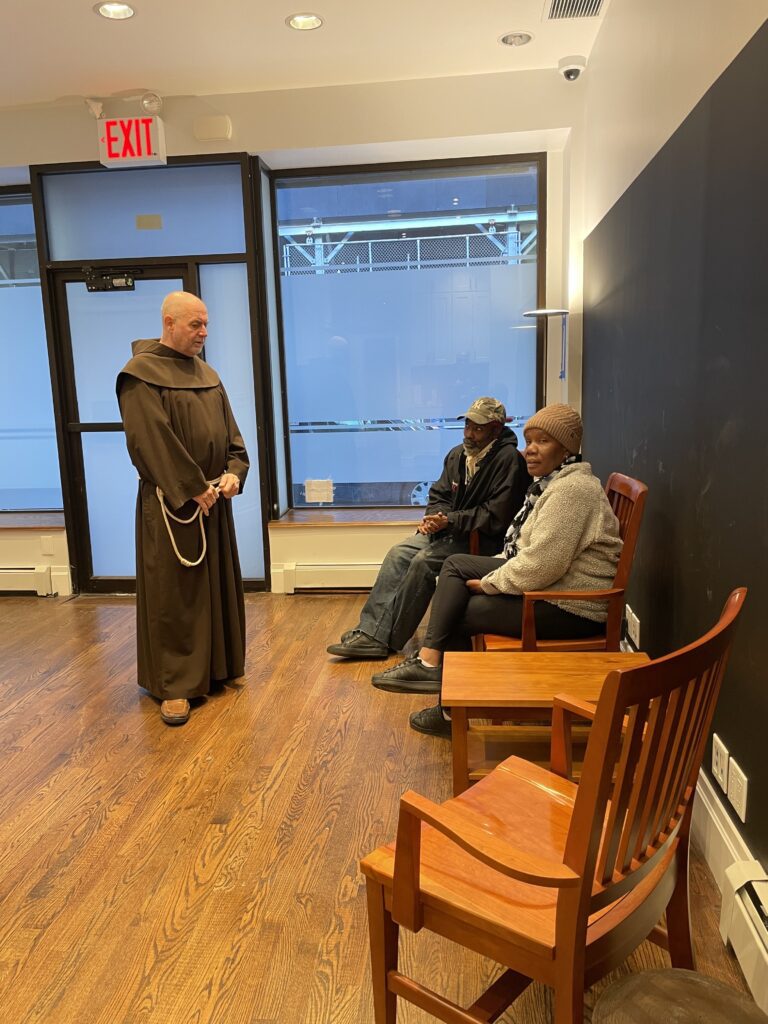
“A popular lunch was fish cakes. And there was always a big push in the evening for lamb, but the fish was always the big draw. We also had like 4 soups a day. We always had a chowder!”
When New York Times writer Clifford Krauss enjoyed a food pilgrimage through Newfoundland to inform his 2004 article, “A Quirky Salt-Air Island,” he mentioned the Duck St. Bistro in the article’s “Where to Eat” section:
Duck Street Bistro, 250-52 Duckworth Street, St. John’s, offers dinner specials like breaded rack of lamb, herb-crusted pork tenderloin, hot Italian sausage, and tomato cream linguine. Dinner for two, with wine, costs around $70, with tax and tip. It is open for lunch and dinner Monday through Saturday.
Of course, the Duck St. Bistro wasn’t Fr. Frank’s final vocation or destination.
“My brother was a friar for nine years, so I knew the friars through him. But when I had the restaurant, I departed from the church for a number of years. One day, a friend of mine was over in Alberta and said, ‘Why don’t you come and meet these people and see what they’re about? And I was looking at a change in my life, so I went over to Alberta, went to dinner on a Saturday night and knew the fit was there. That started the ball rolling. If I get in, I get in. If I don’t, I don’t. That’s life!”
Fr. Frank had left the restaurant business by the time he dined with friars and friends in Alberta, but to his family, his answering the Franciscan call was still a departure.
“A few friends couldn’t understand why, and even my family would say, ‘You serious?’ And they didn’t take me seriously for the first couple of years. When I finally settled down and went to Holy Name Province, now the Province of Our Lady of Guadalupe, they realized Frank was serious about this.”
One of the values that family support worker Frank, restauranteur Frank, and Franciscan friar Frank believes to be an essential cornerstone of Franciscanism should come as no surprise.
“Hospitality,” he says without hesitation. “I think that’s the whole thing. It kind of brought me to the friars in the first place. Being hospitable to whomever—doesn’t matter if you’re a prince or a pauper. We had people who were big donors in the city or politicians come to the restaurant. Sometimes, the staff would write down their names on the chips and other stuff we used to get in the kitchen. I used to tell them, ‘We’re not going to serve them any quicker than anybody else. So, don’t put any names on anything! They had to wait the same as everybody else.”
Today, as a featured chef and personality on Franciscan TV’s Friar Chef, Fr. Frank ensures that no one has to wait for a good time.
“We have fun doing it! I don’t know how much education is in there,” he laughs. “People love the camaraderie—it might bring them in more than the food! When most people talk to me about Friar Chef, they mention what we said or what we did in the show, not necessarily the recipes. It’s neat to hear their interpretation of what we’re doing!”
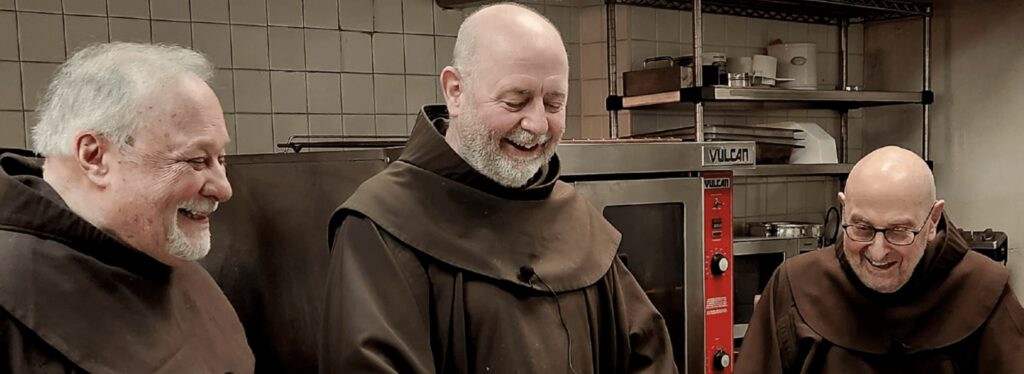
As a chef with extensive family-restaurant-TV cooking experience, what advice does Fr. Frank have for someone who loves to cook and must feed multiple family members?
“Don’t get stuck to a recipe,” recommends Fr. Frank. “Just go to the fridge and see what you have and cook. That makes it kind of fun. You never know what you have until you look! It doesn’t have to be expensive. The big thing is that you have to allow your family to experience different things, and it’s good to start them early on that. It’s nice for families to look at other cultures and say, ‘OK, I can do this.’ Food really brings people together. I always say that if everybody could sit down at a meal, it would be a better world.”
“The art of hospitality is a part of God’s work of love.” – Pope Francis
“People will forget what you said, forget what you did, but people will never forget how you made them feel.” – Maya Angelou
“Being hospitable to whomever—doesn’t matter if you’re a prince or a pauper. I think that’s the whole thing.” – Fr. Frank Critch, OFM (paraphrased)

